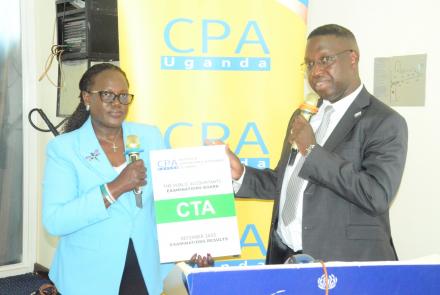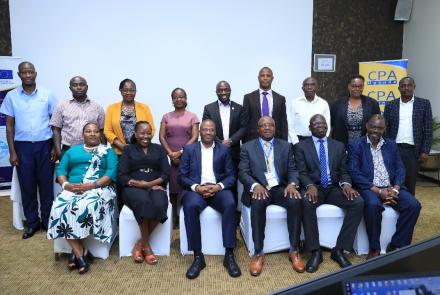By Jackline Nabirye
Communications Officer
ICPAU
Dr Yona Baguma, the Director General of the National Agricultural Research Organisation (NARO), has urged accountants to support agricultural research and innovation as key pathways to unlocking the country’s economic transformation.
Speaking at the 13th CPA Economic Forum, Baguma emphasised that commercial agriculture, supported by cutting-edge science and value addition, is essential for Uganda’s goal of building a fully monetised economy.
Under the theme “Sustainable Economic Growth: Transforming Today, Thriving Tomorrow,” Baguma presented NARO’s role in driving socio-economic transformation through agricultural research, technology development, and commercialisation of innovations.
“Agriculture is not just Uganda’s economic backbone but a sector with vast untapped potential to drive industrialisation, expand services, and grow digital markets,” he explained.
Baguma highlighted the ongoing challenges faced by Uganda’s agriculture sector, including widespread pests and diseases affecting key crops like maize, cassava, matooke, and horticultural produce. He pointed out specific threats such as bean anthracnose, cassava brown streak, and the mango fruit fly. In livestock, the sector is grappling with challenges like tick-borne diseases, poor genetics, degraded pastures, and livestock welfare issues.
Despite these challenges, NARO’s efforts have delivered significant results. To date, the organisation has released over 1,000 agricultural technologies, including 289 improved crop varieties. These include nutrient-rich sweet potatoes, disease-resistant black rice, and coffee varieties that withstand coffee wilt and leaf rust.
“Such innovations will not only improve food security but also support import substitution and enhance Uganda’s export competitiveness,” Baguma noted.
He emphasised that Uganda’s food security is directly linked to its national security, and called for urgent efforts to improve productivity, address pest and disease outbreaks, and enhance the adoption of modern farming technologies. According to Baguma, NARO’s work is aligned with the National Development Plan IV, contributing directly to agro-industrialisation, climate resilience, and sustainable land and water management, and indirectly to human capital development and regional economic growth.
One of NARO’s standout innovations is the development of Uganda’s first anti-tick vaccine, which has shown promising results in controlling tick-borne diseases, a problem that costs Uganda’s cattle sector an estimated UGX 3.8 trillion annually. In addition, the organisation has developed improved breeds of goats, chickens, and cattle, all designed for faster growth, better yields, and greater resilience to disease.
Baguma also explained some of NARO’s advances in agri-based industries, including specialty food products like nutrient-dense coffee bread and health-focused coffee-cocoa skincare products. NARO’s innovations in food safety, such as aflatoxin mitigation in maize and groundnuts, as well as energy-efficient fish smoking kilns, further illustrate how agricultural research can improve livelihoods and protect public health.
He also called for increased investment in agricultural research, agri-tech commercialisation, and capacity building to ensure that Uganda fully realises the economic potential of its agriculture sector. He emphasised the need to integrate agricultural technologies into national development policies, bridge the gap between academia and industry, and establish Agrotech parks to spur innovation.
“Accountants must help track investments in agricultural research and ensure resources are used efficiently to deliver measurable results. Agriculture is the foundation of Uganda’s economic future, and we must all play our part in making it thrive,” he concluded.
The 13th CPA Economic Forum is being held from 9 - 11 July at the Imperial Resort Beach Hotel, Entebbe and online, providing a platform for experts, policymakers, and professionals to develop actionable strategies for Uganda’s sustainable economic growth. Resolutions from the discussions will be forwarded to the Ministry of Finance Planning and Economic Development, as the accountants’ input into national economic policy development.
The forum is supported by key partners including Bank of Uganda, PKF Uganda, National Social Security Fund (NSSF), National Agricultural Research Organisation (NARO), Uganda Printing & Publishing Corporation, Electoral Commission, Uganda Electricity Generation Company Limited (UEGCL), Stanbic Bank, Centenary Bank, MTN Uganda and Prudential Uganda.
END




